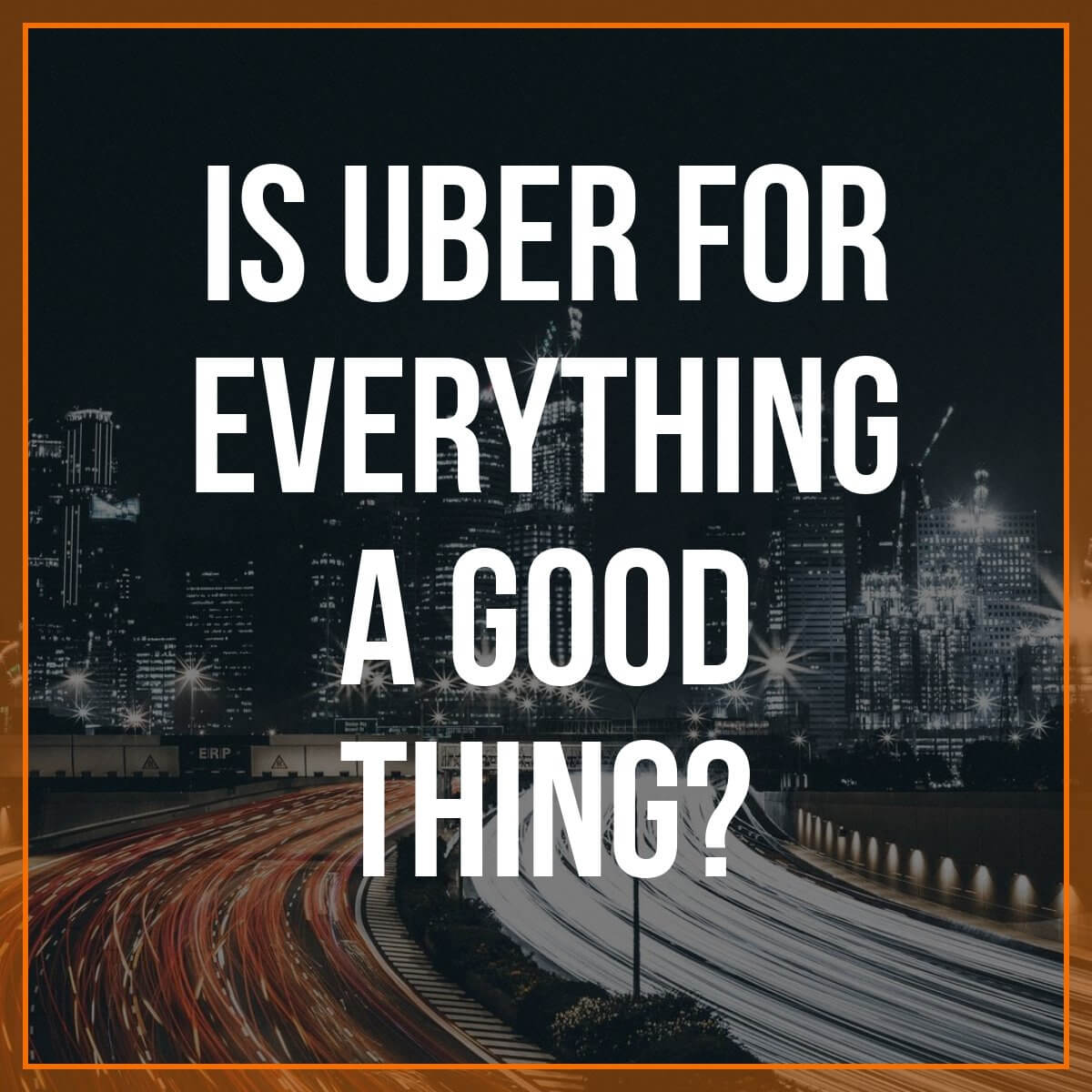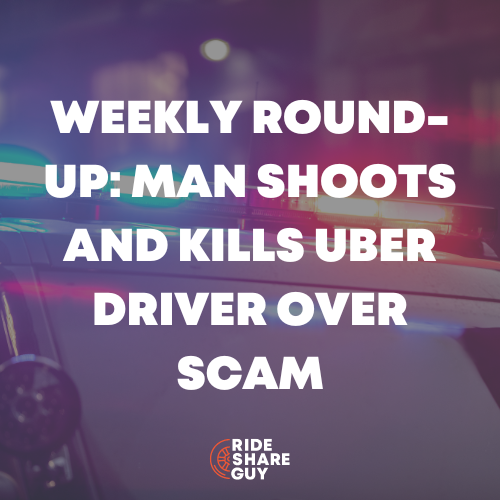Is it possible we could live in a world of ‘Uber everything’? Is it a world that would be better or worse for people? Senior RSG contributor John Ince tackles that tough question, plus bathroom woes for drivers, and Cargo’s new partnership with Uber in this week’s round up.

Is Uber For Everything A Good Thing? [Forbes]
Sum and Substance: A few months ago, Uber announced plans to launch UberEats in 100 new cities across Europe, the Middle East, and Africa, bringing its global operations to around 300 cities. As Jason Droege, VP of Uber Everything – yes that’s his real title – explained, “I think it’s in Uber’s DNA to expand.” The food delivery division is on track to do $6 billion in bookings this year.
Earlier this month, Uber announced plans to invest in Lime, a California-based escooter company. Uber will brand and add Lime escooter service to its mobile app, giving customers another option for getting around cities, especially to and from public transit stations.
Given the company’s soaring ambition, are we destined to live in a world where Uber becomes the Amazon of urban transportation – the matchmaker for all intracity vehicular movement? And is that a good thing? Let’s examine the pro and con arguments in sequence.
Uber’s drivers have struggled to earn a living wage, particularly those who rely on the company as a predominant source of income. Uber has been shrinking driver compensation for years in many urban markets in its quest for profitability, while lagging its competitors on driver satisfaction and retention. Uber has yet to prove that they have a sustainable business model, losing more money faster than any startup in history.
Unless and until Uber can address these existential threats – particularly the last — the company cannot survive, let alone prosper. So let’s stipulate for now that under new leadership, Uber is aware of and working towards a sustainable future on all fronts…
The customers for Uber’s core rideshare business have been exceptionally well served. To the chagrin of traditional taxi operators, Uber has delivered a cheaper, faster and more convenient alternative for tens of millions of riders… As a result, Uber has benefited low-income second shift workers, late night revelers, and many others historically constrained by limited travel options. Uber has thus created a number of positive externalities – i.e., benefits enjoyed by third-parties, including local real estate owners, restaurants, bars, shops and entertainment venues, all contributing to an expanded tax base. …
… Uber lost more than $4 billion last year, and has signaled the likelihood for continuing heavy losses going forward. If city governments impose stringent congestion taxes and/or minimum wage requirements, the company’s financial viability would be at risk. At a minimum, Uber would be forced to raise prices (perhaps considerably) and rein in its ambitious growth initiatives. Investors would undoubtedly be less inclined to provide new capital, perhaps scuttling Uber’s planned IPO in 2019. …
My Take: This is the best and most thorough article on Uber I’ve read in awhile. The basic thesis is worth serious consideration – is Uber trying to do too much? If we learned anything during the melodrama surrounding the ouster of former Uber CEO Travis Kalanick, it was that Uber’s board and management are certainly not infallible.
Uber’s aggressive moves toward competition with public transit, food delivery, scooters, air taxis all are fine as long as there is some financial discipline around their moves. With investors still throwing money at the company, Uber apparently still is in expansion mode. That won’t continue indefinitely. This article explains why.
Thousands of Uber drivers to get settlement checks [CBS News]
Sum and Substance: Thousands of current and former Uber drivers will start receiving checks averaging $223 this week, thanks to a Federal Trade Commission settlement made last year with the ride-hailing concern. The FTC had sued Uber last year, claiming it mislead drivers with both false income estimates and misleading lease agreement terms.
Specifically, the FTC alleged that Uber had claimed that the annual median income for UberX drivers in New York was $90,000 and $74,000 in San Francisco. However, the agency said these claims were inflated by $20,000 to $30,000 annually. The median income in New York was actually $61,000 and $53,000 in San Francisco, according to the FTC. Less than 10 percent of UberX drivers were able to earn the amounts Uber claimed as its average.
Moreover, Uber’s “vehicle solutions program,” which helps drivers buy and lease cars, had claimed it could get consumers into purchase agreements for as little as $140 per week ($560 per month) and could arrange vehicle leases for as little as $119 per week ($476 per month). In reality, they paid $160 per week ($640 monthly) for leases and $200 per week ($800 monthly) to purchase cars through the program, according to the FTC.
… Notably, the settlement amount is apparently unrelated to actual claims for damages. FTC Commissioner Maureen K. Ohlhausen objected to the settlement when it was struck for this reason, claiming that consumer’s actual damages were likely to be less than the $20 million that the FTC received. However, the FTC now says nearly 88,800 drivers qualify for checks. With that substantial pool of claimants, the average check adds to less than the estimated loss that the FTC claimed the average Uber driver would have suffered in just a month or two, if that driver had relied on the site’s claims to buy or lease a car. …
Checks will be mailed this week, …
My Take: While it’s certainly good news for drivers that they’ll be getting settlement checks, it really makes you wonder about a legal system that takes over 3 years to figure things out and arrive at a settlement. Since this lawsuit was filed, an awful lot has changed. Uber has a new CEO. Some drivers are making less, and the entire pay structure has changed as fees are added, bonuses play a bigger part and per mile rates have dropped. It’s really difficult for such a cumbersome legal system to keep up with changes in the tech world.
Uber driver caught peeing in bottle with passenger in car [New York Post]
Sum and Substance: An Uber driver was caught on video peeing into a bottle while driving a passenger around on Monday night.
Raichelle Carter was taking an Uber Pool ride, but was alone in the car when she caught the driver trying to surreptitiously sprinkle into a bottle while she was in the back seat of his minivan, she told The Post.
“I had my headphones in and was just trying to chill and unwind, and then I notice that we stopped moving. Then I see him unbuckling his pants and hear urine hit the bottle,” Carter fumed of the Monday night incident…
Uber officials said they banned the driver, whose named popped up as Avraham on Carter’s app, from the platform.
“This is completely inappropriate and a clear violation of our community guidelines,” said an Uber spokeswoman. “The driver’s access to the app has been removed.”
Taxi and Limousine Commission officials acknowledged that it can be hard for drivers to find the time and a place to urinate while on the job, but also pointed out that he could have used one of the 19 relief stands set up for TLC workers in Manhattan.
“The driver unquestionably used poor judgment in his desperation, and this is not condoned in the TLC’s rules,” said agency spokesman Allan Fromberg.
“The practical truth, however, is that despite the existence of 19 FHV relief stands in Manhattan alone, bathroom access is a real problem for drivers resulting in real health risks, and we encourage restaurants and other establishments to make their facilities available to drivers in need.”
My Take: Oh my! How many drivers have been in this guy’s situation? I know I have… but I’m happy to report I’ve never peed in a bottle with the passenger in the car. I hope you haven’t too. Because if you do, your days as a rideshare driver are numbered.
Uber lays off 100 self-driving car operators in Pittsburgh [CNBC.com]
Sum and Substance: Uber is replacing the operators with 55 so-called “mission specialists,” technical specialists trained on both on-road and test track conditions. Uber said it hopes to return self-driving cars to the roads of Pittsburgh in the summer. Uber has laid off 100 self-driving car test drivers in Pittsburgh in the wake of a high-profile crash in Arizona.
The company is replacing them with 55 so-called “mission specialists,” technical specialists trained on both on-road and test track conditions, as it continues to scale back operations in the wake of the crash. …
Earlier this year, one of Uber’s autonomous car operators hit and killed a woman in Tempe, Arizona, while in autopilot mode. The company shut down operations and laid off 300 safety drivers in Arizona following the incident. It said it would instead focus its push toward autonomous vehicles in San Francisco and Pittsburgh. …
My Take: Having gotten burned in a PR firestorm after the traffic fatality caused by a negligent operator in Tempe, Arizona, Uber seems determined to learn from its mistake. That’s kind of the mantra in autonomous vehicles – everything is a learning opportunity and experience. I sure hope Uber learned its lesson, because any more fatalities could be fatal to the company’s ambitions in driverless cars.
Your Uber could now come with snacks, drinks, electronics [CNET.com]
Editor’s Note: We’vecovered Cargo several times before (including avideo here), and even our very own John Ince has mentioned he’s ambivalent about it. But there’s nothing to be ambivalent about now – Uber and Cargo have partnered up to help drivers provide snacks and other goodies to passengers and help drivers earn extra money.
Drivers with other ridesharing companies, like Lyft, can also still use Cargo. Senior RSG contributor Christian Perea is also quoted in the article, so check it out and let us know how Cargo has helped you earn extra money!
Drivers earn a 25% commission on all sales plus $1 for every transaction – including free products. Sign up with Cargo here!
Drivers, what do you think of this week’s round up?
-John @ RSG




